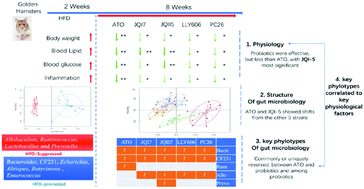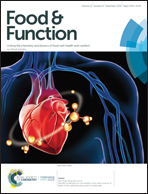Probiotic strains improve high-fat diet-induced hypercholesterolemia through modulating gut microbiota in ways different from atorvastatin†
Abstract
Hypercholesterolemia is a major risk factor for cardiovascular disease (CVD). Probiotics are one of the most popular dietary supplements for hypercholesterolemia, but there are questions as to whether there are differences between probiotics and cholesterol-lowering drugs like atorvastatin (ATO) both in effectiveness and in the underlying mechanisms. In this study, the hypocholesterolemia effects of 4 probiotic strains were investigated and compared with ATO, focusing on their impacts on the gut microbiota. A hypercholesterolemia model was established via high-fat diet (HFD) in golden hamsters after which ATO and the 4 probiotics were orally administered individually for 8 weeks. All probiotics were effective, but less than ATO, on body weight, serum parameters (TG, TC, LDL, INS, HbA1c) and expression of inflammatory factors (INF-α, IL-1β, CRP), with strain JQII-5 being most significant. Besides, these effects were associated with restoration of microbiota dysbiosis induced by HFD. It was worth noting that ATO and probiotics induced different shifts of the gut microbiota in both structure and key phylotypes. Most interestingly, Allobaculum, a HFD-suppressed genus, reported to be involved in alleviating oxidative stress, was enriched by all tested probiotic strains, but not by ATO. Furthermore, Prevotella, also a HFD-suppressed genus, was uniquely reversed by JQII-5. Importantly, most of the alerted genera and reversed genera were found to be correlated with the inflammatory state and serum lipid level. Compared with ATO, the probiotic strains were less effective on body weight, hypercholesterolemia, and inflammation. However, probiotics exert additional favorable effects on the gut microbiota, making them excellent potential complements to cholesterol-lowering drugs like ATO.



 Please wait while we load your content...
Please wait while we load your content...